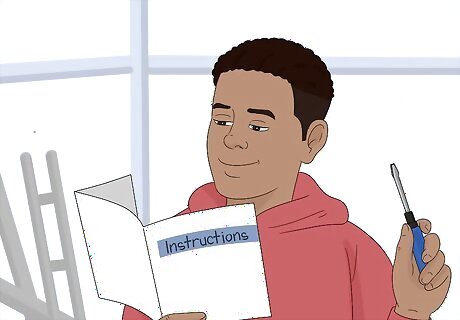
views
- Ask yourself if something satisfies your needs. Something’s usually right for you if your heart’s in it.
- Do research or ask someone for help if you’re not sure what’s right or wrong. The more knowledge you have, the easier a decision can be.
- Know that practice makes perfect. You may not succeed at your goals right away, and that’s okay! Stick with it and see what happens.
Establishing What is "Right"

Understand the goal. What are the things that you are trying to do right, and why are you doing these things? You might be referring to a specific task or set of tasks – or you might just want to do things "right," in general, over the scope of your life. If you want to do a specific thing right—say, court a girl the right way, or complete a sensitive task at work—then you need to know what it means to do that thing right. If it's a task at work, then your supervisor or employer has probably given you some guidelines to define what you're supposed to be doing. If you are trying to treat a girl right, you'll need to answer the question: "right" in whose eyes? If you want to learn to do more things "right," then it might help to examine what you mean. Do you want to be more precise, more structured, and more mindful? Do you want to bring your deeds in line with a certain moral code or value system? Do you want to impress or appease someone?

Make sure that your heart is in it. Check in with yourself: are you doing these things to satisfy your own sense of purpose, or only to please someone else? If you're acting to please someone else, think about why you want to please this person. Ensure that they aren't taking advantage of you and your time. Trust yourself, and remember that you always have a say in the matter. When things are "right", they'll probably feel right on the inside. If something seems a bit off to your gut, it's probably worth investigating where that feeling is coming from and trying to understand it.

Figure out who you're trying to satisfy. Correctness can be deeply subjective, depending on the goals, people, and tasks in question. Thus, in order to do things right, you'll need to answer the question: right in whose eyes? Decide whether you are going by your own concept of "right," or trying to do something right for someone else, or sticking to a broader value system that determines right and wrong. If you are trying to do something right according to your own standards, then ask yourself what is important to you. Is it more "right" to be precise, or to be thoughtful, or to be truthful? If you are trying to do something for someone else, then you'll need to ask them to be clear about what they want. You're going by their concept of correctness, so it is their responsibility to clearly communicate their vision. If you are trying to stick to a standard or a value system, try to learn the system as well as you can. Immerse yourself in this set of rules or way of thinking. Try to internalize it – but not without a grain of salt!
Learning How to Do Things

Read the instructions. If you are trying to do a specific thing right, be sure to absorb any directions or advice to which you have access. The path laid out in the instruction manual is probably not the only way to do things – but it is certainly a way to get your bearings. Trust your own internal compass, but don't be too proud to have a look at the guidelines.

Ask someone. If you aren't sure how to do things right, the best way to learn is to ask for help from someone who does know how to do these things right. If you are at work, for instance, and you are doing things for your supervisor: the best way to get on track is to ask your supervisor for advice and support. Ask questions about specific examples, and try to get the clearest possible picture of your "ideal performance."

Research on your own time. If you want to learn more about a process or a discipline, you'll need to put in some dedicated work to wrap your head around it more completely. Use your passion, your drive, and your curiosity as motivation. Take classes. If you want to know more, then you might consider finding a more structured way to study what interests you. Take free classes online, or find a private tutor, or enroll in a course at a local learning center. Peruse the Internet. There is a wealth of information out there for your learning convenience. Start with a simple web search, and follow interesting links until you are engaged in your research. Read books! Buy or borrow a book on a subject that relates to the things you want to do right.
Meeting Your Goals

Get started. Do not let the desire to do something perfectly stop you from doing the thing! Precision can be very important, but only up to a point. Make a plan, and think about the contingencies, and think about what it will mean to do this thing right – but then do it! Don't wait, and don't procrastinate. You may find that once you get started, everything becomes much more clear. Self-doubt can be crippling. Remember that you can only give what you have. Instead of focusing on some rigid ideal of "rightness," think about how you can put your own uniquely "right" spin on the situation. When thinking about your goals, dream big, but start planning really small. We as humans are so conditioned to fight for our own limitations, which makes us scared to dream big. Train your brain to dream bigger and expand your possibilities.

Practice. Exercise discipline and stay accountable to yourself. Learn how to do what you need to do, and do it more often as you improve. Make a commitment to becoming more effective. The more practiced and confident you are, the easier it will be to do things right.

Keep perspective. It is a wonderful sentiment to want to do things right. However: correctness can be narrow and subjective, and it is important to remember that there are often many ways to do a thing. Don't be too hard on yourself! Try to do things right, but also try to do them thoughtfully. Make sure that your heart's in it. Do not lose sight of why you're trying to do things right. Do not let your obligations and responsibilities cloud your purpose. Don't be afraid to challenge and change the way that things are laid out. You are the one doing these things! You have the power and prerogative to take ownership of your actions and set your own course. If you're always doing the same things and getting the same results, things will never change. Though they might change for the worse, they can also change for the best.




















Comments
0 comment